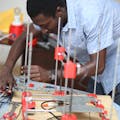Water is essential for human survival. Although approximately 71% of the world is covered in water, only 2.5% of this is freshwater; hence, freshwater is a valuable resource that must be carefully monitored and maintained.
The increase in human activities over the years is having a devastating impact on the environment, directly resulting in a cost to human health, particularly in developing countries, the growth of slum cities, poor sanitation facilities, and activities of mining companies all contribute to negative impacts on the environment.
Water quality monitoring has over the past years mainly relied on a manual approach for sampling and analysis, where human user would travel to a water source, and sample one or more of water, and transport these samples to a laboratory for subsequent analysis. These method of water quality monitoring have several limitations and sources of error, which includes human error during sample collection, as well as during subsequent analysis and data recording, errors due to transportation, type of container used for sample collection, errors introduced by the laboratory equipment’s. This method is again expensive, tedious and can only be handled by trained professionals.
Research has shown higher levels of lead and mercury in water bodies in some mining communities in Ghana. However, the conventional method of detecting these heavy metals in Ghana requires expensive equipment, periodic transportation of sampled water from site to the laboratories for analyses.
These method does not give real-time status of the level of pollution as the results only reflects the periods of sampling.
High levels of these heavy metals are very toxic to humans, animals and plants life. In humans Mercury and Lead has been shown to cause cancer and affect the development of fetus, with several effects on the kidney, brain, liver etc.
We seek to develop a low-cost sensor for detecting mercury and lead in water bodies at mining and industrial areas in Ghana.







_ztBMuBhMHo.jpg?auto=compress%2Cformat&w=48&h=48&fit=fill&bg=ffffff)















Comments
Please log in or sign up to comment.